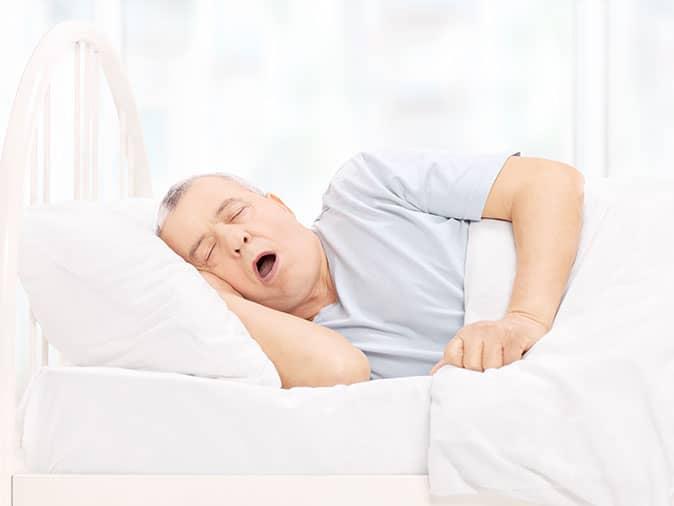A Deadly Condition That’s 85% Undiagnosed
Do you wake up unrested no matter how long you sleep? Do you have headaches in the morning, and doze off in the afternoon, even when at work or driving? Have you been diagnosed with physical or mental health problems, but the usual treatments aren’t working? You might blame this on many things: an old mattress, a boring job, stress, or just aging. But the more likely truth is that you have sleep apnea, a condition where your breathing stops during sleep. Thankfully, this is treatable but left untreated it is potentially deadly.
Unfortunately, about 85% of people don’t know they have it. This means these people are facing an early grave from a treatable condition just because they don’t know they have it. If you suspect you might have sleep apnea, you can find out for sure with a home sleep test. Please use our contact form to get started ordering a sleep test you can take at home in the comfort of your own bed.

What is Sleep Apnea?
Sleep apnea is a condition in which your breathing stops during sleep. Although most people experience brief pauses in breathing, apnea is when your breathing stops long enough that your brain senses a problem (such as a lack of oxygen or excess of carbon dioxide) and has to wake slightly to resume breathing.
You don’t usually notice the waking, even though it can happen dozens of times an hour and hundreds of times a night. But your body notices because it can’t spend enough time in the deep, restful stages of sleep. Every time you wake up because of apnea, your heart and lungs are told to work harder to drive more oxygen to the body and brain. Over time the disturbed sleep and excess stress on your cardiovascular system result in dangerous, even deadly complications.
There are two types of sleep apnea: obstructive (OSA) and central (CSA). In OSA, your airway collapses, cutting off your access to air. In CSA, your brain stops telling your body to breathe. Obstructive sleep apnea is the most common kind, with about 98% of people who have sleep apnea having this type, although many people have both types.
Symptoms and Diagnosis
The only way to diagnose sleep apnea is with a sleep test. However, there are many symptoms that you can use to assess your risk of the condition. This includes:
- Loud snoring
- Gasping and choking during sleep
- High blood pressure that doesn’t respond to medication
- Daytime sleepiness
- Dozing off at work or while driving
- Morning headaches
- Loss of interest or energy
- Weight gain
- Memory problems
- Depression, irritability, and mood disorders
- Loss of sexual interest or function
- Frequent nighttime urination (nocturia)
There are also many others. You can read more about the signs and symptoms of sleep apnea.
Snoring & Sleep Apnea
Although not everyone who snores has sleep apnea, snoring is one of the most noticeable symptoms associated with obstructive sleep apnea. Most people who snore are at risk for sleep apnea. The louder your snore, the higher your risk.
However, it’s important to understand that snoring is in itself a potential health danger. It can be associated with poor sleep, cardiovascular problems, and more. People who snore should be tested, and they should consider treating their snoring even if they don’t have sleep apnea.
Dangers Associated with Sleep Apnea
Sleep apnea is a potentially deadly condition because of the dramatic impact it can have on your entire body and mind. People can experience complications like:
- High blood pressure
- Heart failure
- Stroke
- Pulmonary embolism
- Uncontrollable diabetes
- Traffic or workplace accidents
- Dementia
- Kidney and liver disease
- Cancer
- Depression and mood disorders
- Suicide
Learn more about dangers and health problems that sleep apnea may cause.
Treatment can reduce these risks, and the sooner treatment starts, the more risks can be reduced. However, research shows that it’s never too late to start sleep apnea treatment. People who start treatment after they have a heart failure or stroke can reduce their risks of repeated problems.
Sleep Apnea Treatment
There are several successful approaches to treating sleep apnea. The most common treatments are:
- CPAP (continuous positive airway pressure): uses forced air to keep your airway open and maintain air supply even if you experience a central apnea.
- Oral appliance therapy: Uses an oral appliance you put in your mouth during sleep. This holds your jaw in a position to help keep the airway open.
These two sleep apnea treatments are about equally effective. The best one for you will depend on the nature of your apnea and your ability to comply with treatment protocols. Your doctor or dentist will recommend the best treatment for you.
Are You Worried You Might Have Sleep Apnea?
If you think you might have sleep apnea, it’s important to get tested. But this is often easier said than done. That’s where SleepTest.com can help. Either you or your doctor can order a sleep test with our online protocol. Whether it's covered by your insurance or you're a self-pay customer, you can order an affordable at-home sleep test! Two-day USPS shipping both ways is included.



